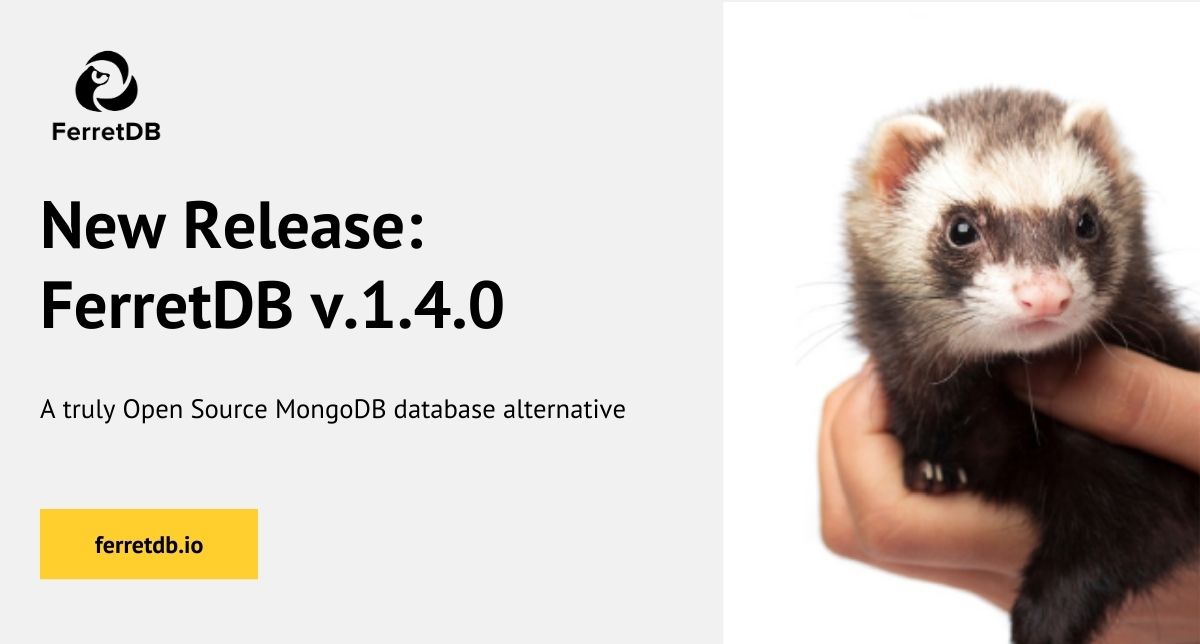
We're delighted to announce the latest FerretDB release – v1.4.0, which now includes options for creating unique indexes, and support for more aggregation pipeline stages, among other interesting updates.
Building on the list of currently supported commands, we've been working to improve compatibility and enable more real-world applications to use FerretDB as their open-source MongoDB alternative. To facilitate this, FerretDB has seen several feature updates, enhancements, and bug fixes since the first GA announcement.
All of these have led to a great deal of interest in FerretDB from different communities, most importantly the open source community and contributors willing to help us with these improvements; for example, one of our newest contributors, @shibasisp, was instrumental in implementing the $unset, $set, and $addField aggregation pipeline stages in this release.
We thank everyone that has contributed to FerretDB – you've all been amazing!
New Features
One of the notable features in this release is the implementation of the createIndexes command to support unique indexes; this should help ensure uniqueness in your indexes so that no two indexed fields have the same values.
You can create a unique index by setting the unique option in the createIndexes command as true.
db.collection.createIndexes({ indexedfield: 1 }, { unique: `true` })
Read more about unique indexes in our documentation.
Beyond this, we've added $type operator support in aggregation $project stage.
You can use the $type operator in a $project stage to return the BSON data type of a specified field in the documents.
Suppose you have the following document:
[
{
_id: 1,
name: 'John',
age: 35,
salary: 5000
},
{
_id: 2,
name: 'Robert',
age: 42,
salary: 7000
}
]
To return the BSON type of the age field in the documents, you can use the following query:
db.employees.aggregate([
{
$project: {
name: 1,
age: 1,
ageType: { $type: '$age' }
}
}
])
The output will be:
[
{ _id: 1, name: 'John', age: 35, ageType: 'int' },
{ _id: 2, name: 'Robert', age: 42, ageType: 'int' }
]
In addition to already supported aggregation pipeline stages, we have now added support for the $unset, $set, and $addFields stages.
The $set stage modifies the values of existing fields, while the$addFields stage adds new fields or updates the values of existing ones in the aggregation pipeline; the $unset stage excludes or removes specific fields from documents passed to the next stage of the aggregation process.
The $set stage can only update the values of existing fields, while the $addFields stage can add new fields or update the values of existing ones in a document.
Use the $addFields stage to add the department and employmentType fields to all documents:
db.employees.aggregate([
{
$addFields: {
department: 'HR',
employmentType: 'Full-time'
}
}
])
The output will be:
[
{
_id: 1,
name: 'John',
age: 35,
salary: 5000,
department: 'HR',
employmentType: 'Full-time'
},
{
_id: 2,
name: 'Robert',
age: 42,
salary: 7000,
department: 'HR',
employmentType: 'Full-time'
}
]
Let's use the $set stage to update the department field:
db.employees.aggregate([
{
$set: {
department: 'Sales'
}
}
])
The output:
[
{ _id: 1, name: 'John', age: 35, salary: 5000, department: 'Sales' },
{
_id: 2,
name: 'Robert',
age: 42,
salary: 7000,
department: 'Sales'
}
]
Use the $unset stage to remove the salary field from documents passed to the next stage in a pipeline:
db.employees.aggregate([
{
$unset: 'salary'
}
])
Output:
[
{ _id: 1, name: 'John', age: 35 },
{ _id: 2, name: 'Robert', age: 42 }
]
Other Changes
To improve our documentation and content, we've included textlint rules for en-dashes and em-dashes so we don't wrongly document them. We've also updated our contribution guidelines to include description of our current test naming conventions – have a look at that here. To learn about other changes in this release, please see the FerretDB release notes for v1.4.0.
We're always looking to improve the features of FerretDB, so any suggestions, feedback, or questions you might have would be greatly appreciated. Reach out to us here.
Be a part of the FerretDB community - check us out on GitHub.
